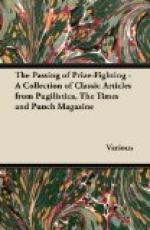You probably know Mr. BLACKWOOD’S elusive method of mystery-mongering by now. None of his characters can ever quite make out whether the latest noise is a mewing cat, the wind in the trees or the Great God Pan flirting with the Hamadryads. He meets in Egypt a Russian, consumptive with a hooked nose and a rotten bad temper, and persists in seeing him as a hawk-man dedicated to the winged god, Horus. “No one could say exactly what happened.” (They never can.) But it was something very solemn and important, and in the end the Russian, in a fancy dress of feathers, was found dead at the foot of the cliff, whither he had flown (or was it danced?—well, no one quite knew). He all but carried with him little golden-haired Vera, who was all but a dove. This is a quite characteristic sample out of Day and Night Stories (CASSELL). And the conclusion I came to was that Mr. BLACKWOOD must get a lot of fun out of staying in “cosmopolitan hotels.” You need a special attitude for the proper enjoyment of these mystical yarns. I read them all conscientiously through, and I got far the best thrill out of “The Occupant of the Room,” which, attempting less, was much more successful. “H.S.H.,” His Satanic Majesty, of course, who was climbing the Devil’s Saddle and turned in to the Club hut for desultory conversation about his lost kingdom with a stranded mountaineer, left me inappropriately cold. I suppose I am immune, a bad subject: but I feel as sure as I’ve felt about anything in the realm of light letters that a charming writer is overworking an unprofitable vein.
* * * * *
Mrs. Vernon’s Daughter (METHUEN) is what one might call a story of situation. That is to say, it leads up to, and declines from, one big scene a faire. The scene, in this instance, is that in which Demaris, who has always previously imagined her mother to be an undervalued heroine, finds that on the contrary she is really no better (indeed a good deal worse) than she should be. And as if this disillusion were not enough the poor girl gets almost simultaneously the further shock of learning that the same adored parent, supposed by her to be a tragedienne of the first water, is in fact no more than a handsome stick, and unable (as they say) to act for nuts. Jesting apart, I am bound to admit that Lady TROUBRIDGE has risen admirably to the demands of her theme, and written a story both direct and appealing. Perhaps (dare I say?) its emotion is rather more secure than its grammar. The fact that she makes a duchess allude to “these kind of things” struck me at first as a subtlety of characterization, till I discovered that, some pages later, the author fell herself into the identical pit. But I suppose there is hardly any one of us wholly innocent of this offence; anyhow, it is only a small blemish upon a pleasant and (in its mild way) interesting story.
* * * * *




